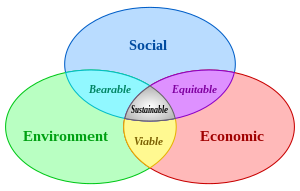
The three pillars of sustainability. Click on image areas for more information. (Photo credit: Wikipedia)
Green banking is ethical banking that is socially responsible and promotes environmental sustainability. At first glance, several banks tout their “greenness” in advertising and marketing, but upon closer inspection,it is apparent that many of these institutions limit their efforts to the provision of online services and other practices that reduce the use of paper, thereby appealing to “tree huggers” (a derogatory term for environmentalists who support restrictions on the logging industry and who fight for preservation of forests). These same banks have adopted procedures to reduce the often burdensome paper load traditionally required for many of their products, including, but not limited to, mortgages, certificates of deposits and loans, both residential and commercial.
Many financial institutions have incorporated banking with the use of mobile applications. The development and introduction of mobile apps to the smartphone market has gone a long way to provide customers access to their bank account 24 hours a day, with the ability to transfer funds between their accounts in one bank, as well as pay bills and transfer money to outside banks or individuals. It is important to note that many of these features were made available so that banks could compete with online payment and money transfer giants, such as PayPal, as well as totally online banks like Ally. These mobile banking apps often include deposit features, which allow customers to make check deposits with the use of smartphone cameras. The increased use of online banking features have resulted in a reduced carbon footprint with savings in time and transportation with fewer trips required to visit brick and mortar facilities; however, green baking encompasses so much more than this.
The essence of green banking is social responsibility, which in turn, fosters sustainability. Green banking has five major components.
- Green finance. While it is required that a bank performs credit ratings in its analysis of a proposed investment project, a green bank also will analyze the environmental risk of a potential investment, and it will reject investment in a project that would be destructive to the environment.
- Green marketing. This activity involves making the environmental benefits of the products and services sold of tantamount importance. These efforts could mandate modifications of products or the production process or changes in advertising to ensure that goods and services, as well as consumer interest, are protected.
- In house green activities. Green banks provide detailed written reports on water and energy consumption, paper use, and the use if supplies, such as ink and toner. Employees are trained in measures to efficiently use energy, equipment and supplies.
- Capacity building and research. While many banks finance activities at regular interest rates in regions and communities prone to hazardous natural events, i.e., floods, earthquakes and droughts, green banks go farther by creating Climate Change Risk Funds to be used in cases of emergency. Additionally, green banks show these expenses for emergencies under general expenses on their balance sheets.
- Corporate social responsibility. Banks are corporations and are expected to be profitable. While most, if not all financial institutions adopt some philanthropic programs, green banking mandates that such institutions carefully manage their economic, social and environmental impact, as well as their influence in “the workplace, the supply chain, the community, and the public policy realm“. [5]
Any financial institution truly committed to “green banking” will ensure that its structure includes the above-stated components. The green banking movement is gaining momentum in the global financial sector, and clearly is a win for the banks, the consumers, and the environment. It is more urgent than ever that we, the green consumers, not only demand the services that we deserve, but also that such services are delivered in line with our values of sustainability and commitment to the environment. Let’s join together to encourage and support green banking. To do so is to live green, be green.
___________________
Resources for this article:
1. http://greenbankreport.com/green-bank-deals/what-is-the-meaning-of-green-banking/
2. http://greenbankreport.com/green-bank-deals/the-future-of-green-banking-is-bright/
3. http://www.linkedin.com/groups/What-is-green-banking-in-4821165.S.208486050?_mSplash=1
4. http://www.hks.harvard.edu/m-rcbg/CSRI/init_define.html
We hold these truths to be self-evident that all men are created equal, that they are endowed by their Creator with certain unalienable rights, that among these are Life, Liberty and the Pursuit of happiness. (July 4, 1776)
Happy Independence Day from LGBG!

A Fourth of July fireworks display at the Washington Monument. Location: WASHINGTON, DISTRICT OF COLUMBIA (DC) UNITED STATES OF AMERICA (USA) (Photo credit: Wikipedia)
The Fourth of July is tomorrow, and for those planning picnics and barbecues, we have some last-minute suggestions to make this day a happy green celebration.
- Buy local produce— This is a great time to support local fruit and vegetable farm stands. In addition to getting the best bargains on your fruits and vegetables, you also will get an extra bang for your buck with fresh products that are organic— no pesticides, preservatives or GMOs.
- Grill green and guilt-free. We know that grilling has an adverse impact on the environment and increases our carbon footprint. This is true with both propane and charcoal grilling. According to Steve Skerlos, environmental engineering professor, “what you grill matters as much or more than how you grill”. The main issue here that often is ignored is the amount of water consumption associated with the production of the product going on the grill. Consequently, chicken and vegetables have less of a water impact than red meat. Skerlos suggests putting as much food as possible on the grill because “the more you cook at once, the more efficient you are going to be”. See video at http://www.huffingtonpost.com/2013/07/02/green-grilling-4th-of-july-barbecue_n_3535757.html?ir=Detroit.
- Reduce electricity consumption. If your holiday party will continue after dark, consider using solar lamps and lanterns. These lights will serve as part of your decor while simultaneously reducing your use of electricity. These products are charged simply placing them in the sun or with the use of batteries. Check Ikea and/or Target for these products.
- Leave fireworks to the professionals. While fireworks are an accepted part of traditional Fourth of July celebrations, we ask that you leave this part of the celebration to the experts. Avoid the use of home firework displays as they often result in injury and/or death. They are costly and not a good buy. Also, they are prohibited in many jurisdictions. Take this opportunity to enjoy municipal or other public displays, which incorporate special precautions to ensure the safety of viewers and which offer spectacular displays.
- Green your alcohol consumption. The Fourth of July is a great time to celebrate with organic wines and beers. There are many selections available to complement healthy grill selections and side dishes. Check with your local liquor stores for suggestions, and do’t forget to peruse the craft beer selections. Two good places to start are:
- http://www.opportunitygreen.com/green-business-blog/2011/05/19/top-10-organic-beers, and
- http://dontfearthevegan.com/2012/05/30/worthy-of-sharing-trader-joes-vegan-beers-wines/.
- Recycle. Please consider recycling your trash during your celebration. Your guests, more than likely, will be pleased to have clearly designated containers for trash. This will save cleanup time when the party is over, facilitate easy curbside placement for trash pickups or trips to the dump, and most importantly give you, the hosts more times to mingle and enjoy your company. Lastly, you will benefit the environment.
We here at LGBG wish everyone a health, happy, safe, GREEN Fourth of July!


